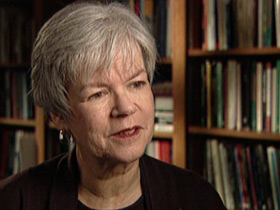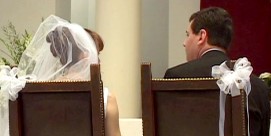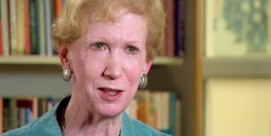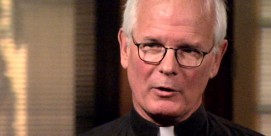In This Episode << SLIDE LEFT TO SEE ADDITIONAL SEGMENTS
Nancy Ammerman Extended Interview
Read more of Kim Lawton’s interview about faith and family in America with Nancy Ammerman, professor of the sociology of religion at Boston University:
What are your general observations about the extent to which family in America has changed and is still changing today?
I think particularly since the 1960s we’ve seen some really dramatic changes in how people think about what a family is, and they are probably all the more dramatic because the 1950s were so amazingly traditional in all sorts of ways. People were able to form those nuclear families and buy those little houses in the suburbs and have their 2.3 children. And so when the 1960s came along, it seemed like such an amazing revolution to begin to think about more people cohabiting, more people divorcing, more people in all sorts of different kinds of family arrangements. We’ve been, I think, trying to sort all of that out ever since.
What about religion? Are we also seeing these changes happening within religious communities?

Religious communities have always in many ways simply reflected the overall American population. They’re not some sort of weird subpopulation that doesn’t act like everybody else. You see these kinds of changes affecting people’s lives, and those people are in religious communities. So the religious communities themselves have also had to think about how to respond to people’s real family situations.
Traditionally, what have American religious leaders taught about family and how families should be?
Religion has always had a strong interest in the family, because families were seen as the way in which the next generation would be socialized into, taught the traditions of the religious community. So it was important for a religious community to say to people, “You should have some kind of a stable family unit in which you have children and teach those children about the faith.” Exactly what that family unit looked like has certainly varied from time to time across our history. And religious leaders have always, to a certain extent at least, taken into account the realities of the contingencies of people’s lives. People don’t always have the perfect kind of fairy-tale life that follows either what religious teachings or our social ideas about a good family look like. I think there’s always been a fair amount of willingness to live with the fact that people’s lives have difficulties in them. That said, I think there’s been a historic pattern in, particularly, the Christian churches, which I know best. But across many religious traditions there is a valuing of marriage, of people who make a lifelong commitment, in part because that value has to do with producing the children and raising those children in the faith.
If what you hold up as the ideal is that you should have a lifelong commitment between a man and a woman in which they raise children, then all of the ways in which people deviate from that pattern were often frowned on. Divorce, for instance, is something that historically has been frowned on in the Christian tradition, going back to various things that Jesus had to say in his ministry. Cohabitation is another matter. Exactly what’s defined as the moment at which that commitment between a man and a woman takes place has varied over time. Exactly when you considered someone “cohabitating” and when you considered them “married” has been up for grabs over history. Certainly over the last century or so we’ve had fairly firm definitions of what we considered a legal, religiously sanctioned marriage. Churches have tended to frown on people living together or being in any kind of an intimate relationship outside of that married unit.
In our survey we found attitudes, particularly among evangelical Protestants and traditional Catholics, that seem to loosen up some of those traditional teachings. For example, fewer and fewer people think divorce is a sin or that cohabitating is wrong. How significant a shift is that?
Certainly the divorce numbers are quite striking. People are, on the one hand, pretty convinced that it’s a good idea for kids to have two parents in the household and for a marriage to last. But they also recognize that there are situations in which that is not the best alternative, and they are remarkably unwilling to label those people who get divorced as “sinners.” They’re willing to see the kinds of contingencies that may come along that make divorce a better option. That is a very significant shift. It’s probably a shift that’s fueled, at least in part, by the fact that women are speaking up for themselves. Women themselves have more alternatives, and that goes across religious lines. That’s not just people who are liberal.
Certainly we expect that in the more conservative communities where traditional values come from Scripture and the traditional teachings of the church. We expect those communities to be ones where you find far fewer people actually divorced — far more, for instance, women staying home with their kids and that sort of thing. And the fact of the matter is that those communities have the same kinds of economic realities to contend with that other communities have to contend with. So while they may hold up the ideal with more tenacity, they’re not necessarily going to condemn people who don’t live up to that ideal.
You mentioned economic realities. What do you think is behind some of these numbers? I’m thinking, specifically, about the evangelical community, where you have the strongest adherence to the ideal of a traditional family: one man, one woman, for life. Yet there are very significant rates of divorce. How do you explain that?
Evangelicals have many of the same economic issues that everybody else has. Among other things, it takes more than one income to maintain a middle-class standard of living in this country, so women are working outside the home at the very same rates that women in other religious communities are working. That’s actually been true for at least a generation now, and that raises, then, all the kinds of issues about who is in charge of what, and conflicts about how we are going to manage our household, and conflicts about how we are going to deal with the kids. All of those contingencies that are there for everybody are there for evangelicals as well.
One might speculate that evangelical men are, perhaps, no less likely to be, for instance, abusive than men in other traditions. Therefore, you may have as many evangelical women who are seeking to get out of “bad” marriages as you have women in other traditions. It’s just not at all clear that being in an evangelical tradition is going to shield you from many of the same kinds of conflicts and problems and contingencies that are there for everybody else.
Do you think it’s a factor that there have been some high-profile evangelicals who have been divorced, as well as growing numbers of divorced people within evangelical congregations? Has that also led to an acceptance of divorce?
Certainly, once you’ve got a critical mass both of the people around you — your neighbors, the people in the pew with you — and the visible leaders in the community who have been through this ordeal of divorce, then it becomes a possibility you can think about. You don’t think about it as something only very strange [that] perhaps “sinful” or “weird” people have been through. It does gain a certain acceptance in the community because of its prevalence in the larger culture.
What about mainline Protestants? The conventional wisdom might be that they’re more liberal on so many issues as a general rule, and perhaps they would be in more liberal family situations. Yet we find pretty stable, traditional families compared to some of the other religious communities. What do you make of that?
The mainline Protestant tradition in the U.S. has long been very, very closely tied to traditional families. This was the community that, if one were a respectable member of the larger community, you got married, you had kids, and you joined a church. And the kind of church you were likely to join was an established, mainstream Protestant congregation in your community. We’ve seen, really throughout American history, this close tie between forming a family, that is, getting married and having children, and joining one of the mainstream religious institutions in your community. It’s not at all surprising that the link between very traditional kinds of households and very traditional religious communities should still be there — traditional not in the sense, necessarily, of what they’re teaching, but traditional in the sense of being mainstays of the respectable, stable community.
We’ve seen such growth in the kinds of families in America – single-parent families, cohabiting families, gay families. And yet, according to our survey, more than 70 percent of all Americans still believe that God’s ideal for a family is one man and one woman. Does that number surprise you? And what do you think is behind it?
I would want to put that support for the one man, one woman for life ideal in the context of the larger cultural debate and other questions you asked people. One of the striking things about that number is it’s actually higher than the numbers of people who say they’re willing to tolerate various other kinds of families, if you ask the question differently. What we’ve seen, I think, in American culture in the last 10 to 15 years is a polarization in the culture around some of these issues. There are certain catchphrases that people use to be able to encapsulate their particular view of what family life is supposed to be about. Once the debate gets encapsulated in those little phrases, then you’re going to get this polarization and very, very high numbers. Part of what you see with that almost overwhelming majority saying, “This is the way family ought to be” is an echo of the larger cultural debate, more than people simply reflecting on their own experience and saying, “This is what I see around me, and this is what I see as the kinds of families that seem to be trying to live out a faithful life.”
We looked at traditional and liberal Catholics as well. How significant are some of those polarizations within the Catholic community?
It is very interesting that there is such diversity within the American Catholic community. We see that in all sorts of ways in Catholic life these days — in how Catholics are responding to their Church and to the teachings of their Church. We’ve known for at least 20 or 25 years that the majority of American Catholics, for instance, don’t necessarily follow what their Church teaches around birth control. And we know that the majority do not, necessarily, follow what their Church teaches around divorce. But we do see substantial groups within the American Catholic Church that want to maintain the traditional, official Church teachings on issues like that. There’s real diversity in a Church that, on the one hand, looks like it ought to be very unified because it has a unified, official hierarchy that pronounces a certain set of doctrines about how a family ought to live.
Any observations about the importance of religion in all families, both traditional and nontraditional? The survey found high numbers of certain types of religious involvement in both.
Actually, I want to come at that question sideways. I think one of the things that’s very striking about the relationship between religion and family in this country is that families have seen religious organizations as important helpers in raising their children. That’s been something from the very beginning of American life here, of Euro-American settlement on this continent. We’ve seen families who have joined religious communities precisely at the point in their lives when they’re getting married and having children. And they’ve seen those religious communities as really important in helping them raise the children they have. They’ve seen raising children as something they can’t really do by themselves. They need a community to do that. And they especially need a religious community, a community that will give their children something more than just general rules. They want their kids to have some sense that they owe allegiance to something beyond themselves, to some kind of sacred or transcendent or divine order that gives life meaning and that tells them how they should live.
And you think that is continuing in the midst of changing family structures?
I think absolutely it’s continuing. We still find that the demographic group most likely to be found in church or in synagogue on any given weekend is the group of people who are married and have young children. They’re far more likely to be affiliated with a religious community than people who aren’t married, or even people who are married and don’t have children. That link between being married, having children and being part of a religious community is still very much a part of American culture.
What about religious organizations, families, and transmitting the faith to the next generation?
Are families worried about their kids growing up to have the same religious tradition? One of the interesting things is that some religious communities are more concerned about passing on their particular faith to their children than are other religious communities. One of the ways mainline Protestant congregations and communities are different is that they’re much less concerned about passing on their particular faith. They obviously have some concern that their kids have some kind of faith. But they are less concerned about whether it is their particular religious tradition. What we’ve seen, of course, over the last generation is that, in fact, mainline Protestant kids are less likely to join the tradition of their parents. There seems to be a pattern emerging that those who are in the mainline Protestant tradition still make this link between family and faith, but they’re not particularly worried about passing on a very specific religious tradition. That really does stand in contrast to people in more conservative Protestant traditions, to even Catholics and Jews and people in other religious communities that really want their kids to learn the particular traditions of their faith.
In an era of religious realignment, was it striking to you how evangelicals and conservative Catholics lined up, more closely than mainline Protestants and liberal Catholics, on many questions about the family?
I think on these family-related issues what has emerged in the last generation is a kind of cooperation between conservative Catholics and conservative Protestants at the level of national leaders. There are organizations and spokespeople who are intentionally trying to make that connection, who are speaking to people in their respective faith communities and making sure that people know it is okay to cooperate across those religious lines. Historically, you might have seen conservative Protestants not particularly eager to cooperate with Catholics of any sort. That’s a major shift in American culture that has been accomplished primarily by these leaders who have found a way to talk about particularly these family issues in a way that resonates with conservative Catholics and conservative Protestants.
Have these social changes put pressure on religious communities theologically in terms of what they teach their communities?
I think you’ve seen a great deal of theological work going on in the last generation as all sorts of religious communities have been trying to figure out what it is they have in their traditions that can help them understand the family worlds that they are encountering today. We find, across the different religious traditions, each of them going back to the things that are important to them. Evangelical Protestants, for instance, are going back and looking at the scripture and what they see in the scripture is warrant, for instance, for what they call “mutual submission,” that is, for husbands and wives to take each other to account. It’s not just a strict patriarchy that says the husband’s in charge and the wife is supposed to submit no matter what. They found in their scriptural tradition warrant for a more egalitarian understanding of marriage.
The liberal Protestant traditions are going back both to Scripture, but also taking into account the long history of theological traditions and social science and all of the other things that liberals are more willing to take into account alongside theology and scripture in order to come up with ways of thinking about what’s really the most important thing about family and coming to notions about family that have to do with love being the defining character of the family — people who really pay attention to each other’s well-being and each other’s thriving in the relationship rather than, necessarily, defining it in terms of who is in the relationship. So you find people going to their own traditions and doing a lot of work with those traditions to make sense of what they find in the world today.







